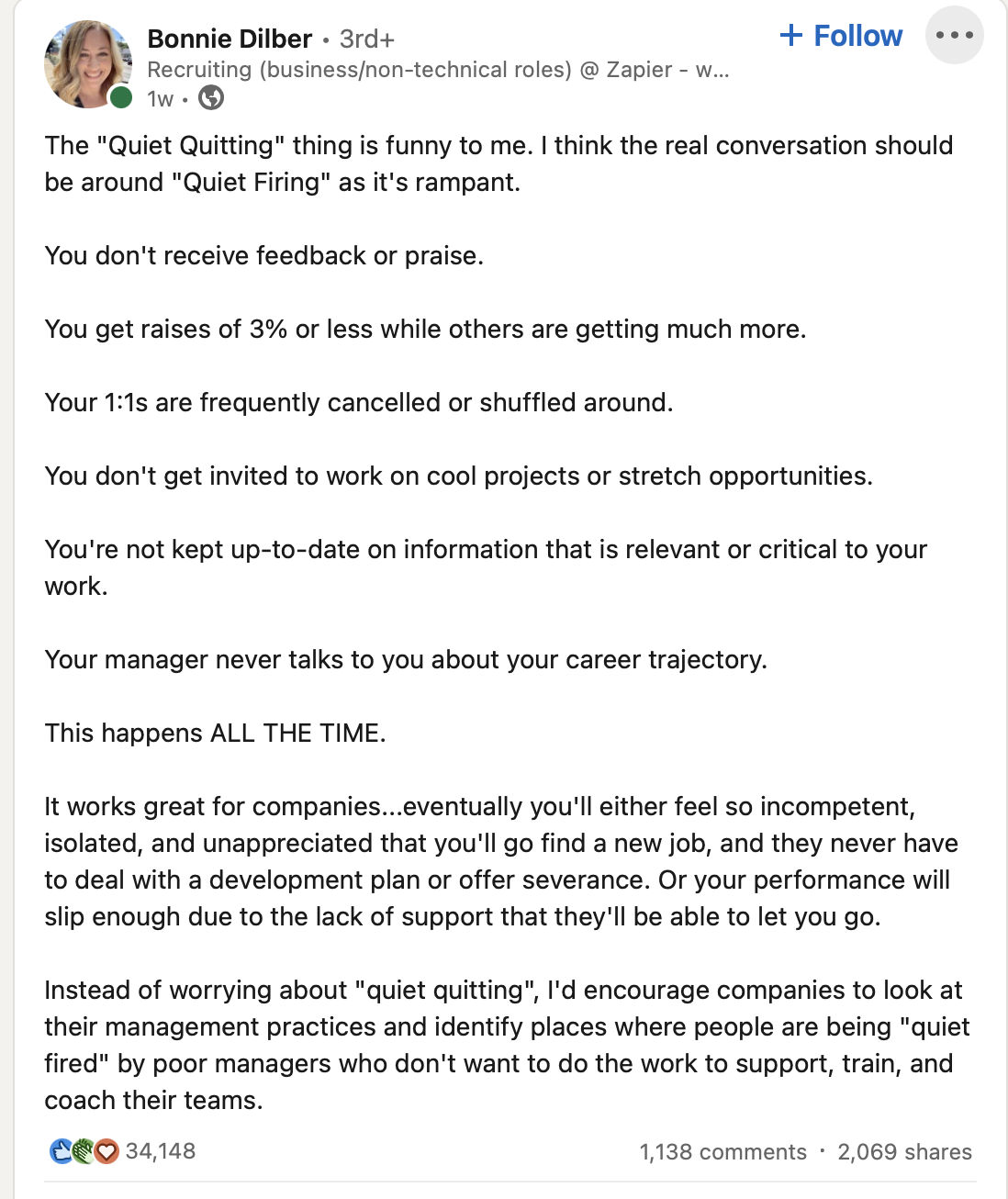
But what IS a quiet quitter – and how do we engage them?

Now we’re back at work - well back working but not actually AT work - it seems that many of our staff aren’t actually working.
Ok, let’s try that again.
Covid seems to be over. Unless you’re in China, and then it hasn’t happened yet. Or not so much. And if it has happened, we certainly won’t tell you.
Anyway, things are back to kind of normal, which means people go to work, or don’t actually go to work they stay at home and work. BUT according to a new Gallup poll they’re actually quitting. But not saying anything.
So the cool management phrase for 2022 is Quiet Quitting.
But does Quiet Quitting actually mean quitting? Well, like going to work may not mean ACTUALLY going anywhere except from bed to the living room table, it appears that the results from the June survey of over 15,000 employees don’t ACTUALLY mean that they are quitting.
Read more: Quiet quitting – how to spot the subtle signs before it’s too late
What the Gallup survey appears to be saying is that the Quiet Quitters are just doing their job now, so that’s like quitting. Sort of.
THEY CALL IT QUIET QUITTING BUT IT'S REALLY JUST DOING YOUR JOB REQUIREMENTS DURING NORMAL BUSINESS HOURS PEOPLE DESERVE A GOOD WORK/LIFE BALANCE AND NOT ANSWERING A WORK EMAIL AT 10PM ISN'T QUITTING IT'S JUST BEING A NORMAL HUMAN WHO HAS A LIFE AND SETS HEALTHY BOUNDARIES pic.twitter.com/uEto7i42VP
— LinkedIn (@LinkedIn) August 18, 2022
As usual it’s those pesky Gen Z and younger millennials at it again – and – according to Gallup it’s our fault. “It's clear that quiet quitting is a symptom of poor management,” the pollsters say in their report.
Still, in all seriousness, it appears that engagement IS dropping, and that Gallup’s recommendation is that we should make sure our managers have a call of at least 15-30 minutes with each staff member each week. That’s if they’re working, but not AT work.
Watch: How to keep your employees happy in the great resignation,
One interesting idea from ex-Accenture MD Kevin Singel is to get your managers to work alongside some of their reports as if they are in a virtual cubicle. “I’ll work alongside my staff for a half an hour or longer,” says Singel, now a Senior Adviser with Pivotal Consulting. “If I’m working on something they’ve done, I can chat to them while I do it. If not we can each do our own thing, and exchange pleasantries while we do it.”
The new reality of a displaced workforce does mean that engagement is even more difficult than it was, and although a number of big employers are pushing hard to get employees back to the office (especially the big US banks) the current talent shortage means that employers are finding their hands tied when trying to exert pressure. In New York, for example, just 35% of staff are back in the office on any given day.
Read more: Why return-to-work perks aren’t working
Our current workplace arrangements may also be incredibly hard to change. “The terms of employment may have permanently changed,” Professor Cornfield from Vanderbilt University told Bloomberg. “Employers may not be able to leverage the greater bargaining power to have more employees return to the office.”
With staff “quitting” but not telling us, and dragging their feet to get back to the workplace, things do look more difficult than they were before Covid (and let’s face it, they were difficult even then). But there is one small grain of solace. Along with Quiet Quitting, we now have Quiet Firing.
This allows us to fire people – without actually telling them – which is firing in the same way that they quiet quit, but actually keep working. In this supposed scenario, managers don’t give employees the support that they might be expected to get, which means in an aggressive introverted way we’re firing them.
“I started thinking about why someone might start doing the ‘bare minimum,’ and I realized maybe the problem isnʼt so much the employees but employers or managers that arenʼt doing much to support or invest in their employees — ‘quiet firing,’” Bonnie Dilber, a recruiter for software company Zapier wrote on Linkedin. “When youʼre in an environment that feels like a dead end, itʼs hard to want to give more.”

And this raises an important question for the exit interview – who did what first (very like that teen romance break up, “I’m dumping you.” “well I already dumped you before you dumped me.”) When someone tells you that they want to hand in their resignation, can you say “well actually we’d already (quietly) fired you”?
Collaboration with co-workers - 74%
Quiet space to work in - 15%
Face time with management - 10%
(Data from Slack’s Future Forum unit, second quarter 2022)